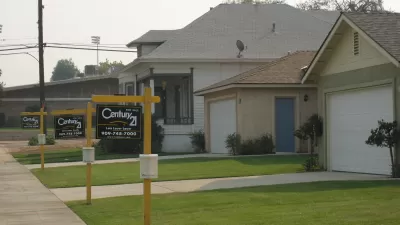A coalition of groups advocating for more funding for local communities and schools want to reform the landmark tax-cutting initiative by treating commercial and industrial properties different than residential, creating the so-called "split roll."

Voter approval of the "California Schools And Local Communities Funding Act," an initiated constitutional amendment sponsored by Schools and Communities First, a wide-ranging group of community organizations, education advocates, unions and foundations, would result in companies with 50 or more employers in the Golden State paying an additional $11 billion a year in property taxes to benefit local communities and schools, reports John Wildermuth for the San Francisco Chronicle.
Backers of the ballot initiative need 585,407 valid signatures to qualify it for the ballot. The 860,000 signatures they collected will be will be turned in to each of the state’s [58] counties for a raw count and verification and then reported to the secretary of state. It will be more than a month before the measure can officially qualify for the ballot.
By aiming the initiative for the November 2020 presidential ballot, supporters would guarantee a strong voter turnout.
Matt Levin of CALmatters reports that organizers received funding "from Bay Area philanthropic organizations such as the San Francisco Foundation and the Chan Zuckerberg Initiative (yes, that Zuckerberg)."
Proposition 13, which passed in 1978 with 63 percent of the voters, turned 40-years-old in June and continues to enjoy the support of a large majority of the state's voters. The initiated constitutional amendment (Article XIII A of the Constitution of the State of California) doesn't distinguish between commercial and residential property, and that's what the initiative's backers hope to change.
Under Prop. 13, all California property ... is reassessed only when it is sold. Houses and condominiums, however, can turn over every few years, while many large businesses occupy their land for decades — meaning some have not had property reassessed since Prop. 13 passed.
The initiative rolled back property assessments to 1976 levels and capped tax increases at 2 percent a year, as long as the property is not sold.
The proposed initiative "would require commercial and industrial property — but not homes and small businesses — to be regularly reassessed and taxed at their full value," adds Wildermuth.
The argument that split-roll supporters make is that it’s not fair that residential and commercial property are both taxed at the same rate. Since major developments like oil refineries, office buildings and amusement parks are rarely sold, their taxes fall further behind their actual value every year.
Jon Coupal, president of the Howard Jarvis Taxpayers Association, named after the man who put Prop. 13 on the ballot, responds. "If the business community loses its Prop. 13 protection, we’re next on the menu,” referring to the 95 percent of his members who are homeowners.
On Thursday, The Chronicle printed their editorial in support of the initiative.
There’s plenty to like in a split roll tax system to replace the lopsided world of Prop. 13 property levies. Businesses, not homeowners, are the big winners in holding down yearly tax bills under the 1978 law that’s endured despite its built-in flaws.
The overall intention is bona fide crowd-pleaser. The proposal is backed by a dream team alliance of unions, civic foundations and school groups. The extra levies collected from business properties would be split between local government and public education.
The editorial closes with the hope that the initiative "is just a start on the much bigger challenge of writing a fair tax system."
Related:
- Questions about Prop. 13? The California Legislative Analyst's Office answers them via Planetizen in a useful, easy-to-read guide published in September 2016.
- On the California November 2018 ballot: Proposition 5, Property Tax Transfer Initiative: an initiated constitutional amendment that would reform Prop. 13. Unlike the California Schools And Local Communities Funding Act, "the nonpartisan Legislative Analyst’s Office [LAO] has estimated the change would cost local governments and schools a combined $300 million a year, with costs rising to $2 billion annually over time," as reported by the Los Angeles Times via Planetizen.
FULL STORY: Big change in California’s Proposition 13 could be headed to ballot

Alabama: Trump Terminates Settlements for Black Communities Harmed By Raw Sewage
Trump deemed the landmark civil rights agreement “illegal DEI and environmental justice policy.”

Study: Maui’s Plan to Convert Vacation Rentals to Long-Term Housing Could Cause Nearly $1 Billion Economic Loss
The plan would reduce visitor accommodation by 25% resulting in 1,900 jobs lost.

Planetizen Federal Action Tracker
A weekly monitor of how Trump’s orders and actions are impacting planners and planning in America.

Baltimore Ordered to Improve Sidewalk Accessibility
The city is one of many to face lawsuits for failing to comply with the Americans with Disabilities Act.

This Toronto Suburb Has More Bus Riders Than Columbus, Ohio
Brampton, Ontario used gradual improvements in service to prove that if you build it, they will ride.

Paris Bike Boom Leads to Steep Drop in Air Pollution
The French city’s air quality has improved dramatically in the past 20 years, coinciding with a growth in cycling.
Urban Design for Planners 1: Software Tools
This six-course series explores essential urban design concepts using open source software and equips planners with the tools they need to participate fully in the urban design process.
Planning for Universal Design
Learn the tools for implementing Universal Design in planning regulations.
Smith Gee Studio
Alamo Area Metropolitan Planning Organization
City of Santa Clarita
Institute for Housing and Urban Development Studies (IHS)
City of Grandview
Harvard GSD Executive Education
Toledo-Lucas County Plan Commissions
Salt Lake City
NYU Wagner Graduate School of Public Service





























